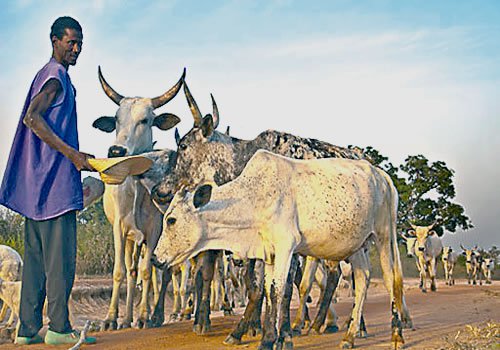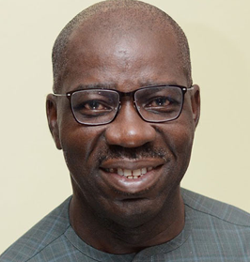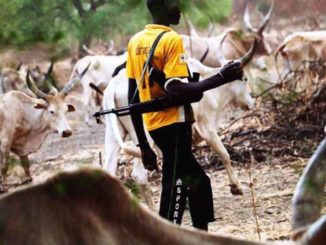
FOR the umpteenth time, Benue State has become a scene of mindless and horrific killings of innocent Nigerians. In a disturbing round of violence that started on New Year’s Day, and is still raging, no fewer than 80 people have been killed in terror attacks by men suspected to be Fulani herdsmen, according to figures released by Terve Akase, the Chief Press Secretary to the Benue State Governor, Samuel Ortom. The attackers left in their wake gory images of mutilated and sometimes decomposing bodies littering burnt and vandalised communities in Guma and Logo local government areas.
It is a sight that has become commonplace in areas where the free-killing herdsmen have had the misfortune of setting their foot. At a moment when people were thanking God for sparing their lives to see the advent of a new year, they least expected that death would come calling in the manner that it did. Some were said to be returning from places of worship when they were gruesomely felled by bullets of the assailants who have a history of unleashing their terror and criminality for hours, without being challenged.
This has rightly raised pertinent questions about the worth of life and the appropriateness of the security model currently in operation in Benue State and, indeed, the entire country. The incessant attacks in Benue and other parts of the country have shown that the government places no premium on the life of its citizens. And, as is often the case in attacks of this nature across the length and breadth of the country, especially those concerning the Fulani herdsmen, the victims suddenly realise their vulnerability – they cannot be protected by the Nigerian state.
In what was obviously a premeditated attack, the victims of the Benue killing fields were, as usual, taken unawares and right in the dead of the night. Their assailants were armed with sophisticated guns and machetes. While some people were shot dead, others were simply slaughtered; and it is easy to guess who most of the victims were – children, women and the elderly – clearly the most vulnerable. This certainly portrays Nigeria as a backward and primitive country, where the most vulnerable cannot get the protection that they rightly deserve.
At issue is the right of the nomadic herdsmen to graze their cattle, which invariably infringes on the right of the farmers to plant and harvest their crops. The herdsmen have a habit of sending their cattle to cultivated farmland, which destroy crops that are a source of livelihood to the farmers. Any attempt to stop them results in killing, raping and destruction of farmland as well as sacking of whole communities.
In a system where the governor is designated as the Chief Security Officer but has no control over the security apparatus, Ortom is often left with no option but a resort to lamentation. Speaking while receiving Edward Kallon, a visiting United Nations envoy, in July last year, Ortom said no fewer than 1,800 people had lost their lives to the menace of Fulani herdsmen in the state between 2013 and 2016. In countries that place premium on citizens’ lives, this is more than enough to take action.
But death is so commonplace in Nigeria that defenceless people being slaughtered no longer shocks Nigeria’s unfeeling rulers. While the Nigerian state seems to be deploying its security machinery to tackle threats to peace by militants in the Niger Delta and Boko Haram in the North-East, not much has been done to counter the threats posed by Fulani herdsmen who consider the whole country their private turf. It is surprising that in a country where carrying unlicensed gun is a crime, a group of people bearing sophisticated guns are allowed to plod their way through private estates unchallenged.
The Global Terrorism Index considers Fulani herders’ raids as the second-biggest threat to peace in the country after the Islamist Boko Haram militants. But despite their notoriety and tendency to inflict mayhem wherever they go, it is very rare to hear of a Fulani herdsman being made to face the law for their atrocious acts, giving the impression that they are a special people, operating above the law. After one of their most prolific exploits in 2014, the GTI named the Fulani herdsmen the fourth known deadliest terror group in the world, after Boko Haram, ISIS and al-Shabaab. According to the report, in 2013, the Fulani killed around 80 people in total – but by 2014 the group had killed 1,229. It says “Fulani militants have very localised goals, mainly greater access to grazing lands for livestock.”
In 2015, GTI reported that the number of people killed by Fulani herdsmen decreased by 50 per cent, amounting to over 630 fewer deaths. For the third year running, Nigeria remains the third most terrorised nation in the world. Yet, the government and security operatives seem to be treating them with kid gloves. Aside from occasional reprimand and “condemnation” from different quarters, nothing is done until they pull off another brutal attack. Nigeria does not have to handle the Fulani herdsmen the way gun violence is being handled in America, where after a demented gunman kills over 50 people and kills himself, the matter is allowed to rest; nothing happens in terms of gun control because the American citizen has a right to carry guns.
After a wave of attacks in Benue, President Muhammadu Buhari has ordered the Inspector-General of Police, Ibrahim Idris, to relocate to the state until full restoration of normalcy is achieved. Yet, if past orders are anything to go by, it is doubtful if the herdsmen can be stopped, especially as the IG himself has already labelled what is happening as communal crisis. Even if it were the case, does it mean people who kill during such crises cannot be called to account?
But the government should know that the activities of the herdsmen are posing a serious threat to the continued existence and unity of this country. The mode of operation of the Fulani killers has given the impression that, in the event of an external aggression, the country cannot be adequately defended. It also shows that the lives of cattle are more valuable than those of Nigerians.
Without mincing words, the herdsmen should be told that open grazing is no longer fashionable around the world where countries with the largest herds of cattle raise their animals in ranches. Besides, Ortom said those who carried out the killings were well-known; then the state should ensure they are apprehended and made to face the law. Failure to restore peace and punish the culprits could drive the victims into considering self-defence.
END




Be the first to comment